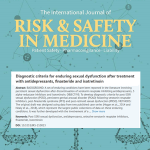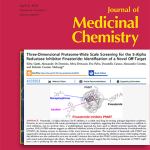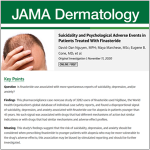Despite multiple randomized controlled trials and meta-analyses documenting an increased rate of adverse sexual events in men treated with finasteride for either androgenic alopecia or benign prostatic hypertrophy, 29% of dermatologists thought that this was unlikely and 20% were uncertain. Fewer than a quarter believed that finasteride could cause depression or lower sperm counts. Irwig […]
Tag Archives: Harvard Medical School
Diagnostic criteria for enduring sexual dysfunction after treatment with antidepressants, finasteride and isotretinoin
A set of enduring conditions have been reported in the literature involving persistent sexual dysfunction after discontinuation of serotonin reuptake inhibiting antidepressants, 5 alpha-reductase inhibitors and isotretinoin. OBJECTIVE: To develop diagnostic criteria for post-SSRI sexual dysfunction (PSSD), persistent genital arousal disorder (PGAD) following serotonin reuptake inhibitors, post-finasteride syndrome (PFS) and post-retinoid sexual dysfunction (PRSD). METHODS: […]
How routine pharmacovigilance failed to identify finasteride’s persistent sexual side effects
When confronted with data that their product could cause persistent erectile dysfunction, the Risk Management Safety Team at Merck, in 2009, had the opportunity to take further action to sort out the issue. Realizing that many adverse event reports lacked adequate information, the team could have recommended conducting additional rigorous prospective studies on finasteride to […]
Risk of Depression Associated With Finasteride Treatment
Crude pooled rates of depressive symptoms with versus without finasteride were 3.33% versus 2.54%; random-effects meta-analysis yielded an odds ratio of 2.14. In addition, risk of suicidal ideation or behavior was greater with versus without finasteride (21.2% vs 14.0%), and risk of sustained sexual dysfunction was high (60.1%). The findings support a growing impression that […]
Investigation of Suicidality and Psychological Adverse Events in Patients Treated With Finasteride
In this pharmacovigilance case-noncase study, significant RORs of suicidality and psychological adverse events were associated with finasteride use in patients younger than 45 years who used finasteride for alopecia. The sensitivity analyses suggest that these disproportional signals of adverse events may be due to stimulated reporting and/or younger patients being more vulnerable to finasteride’s adverse […]
51% of Dermatologists Believe Finasteride ‘May Cause’ Sexual Side Effects—but Only 18% Believe those ADRs May Persist, Says New Harvard Medical School Research
Pioneering PFS investigator Michael Irwig also finds that just 13% of respondents believe finasteride could cause depression, while 54% believe the drug is ‘unlikely’ or ‘very unlikely’ to do so Aug. 16, 2023 Dear Friends: Despite the fact that the finasteride product label has included depression and persistent loss of libido as possible side effects […]
First-Ever PFS Diagnostic Criteria Published in Medical Literature
Editorial in leading journal, meanwhile, criticizes FDA for not making Merck conduct new safety studies when persistent ED signal emerged Nov. 20, 2021 Dear Friends: A decade after the first peer-reviewed article on persistent adverse sexual effects in finasteride patients appeared in medical literature, the first-ever diagnostic criteria for PFS has followed suit. We have […]
In Addition to Blocking 5α-R, Finasteride Inhibits Adrenaline Production, Possibly Inducing Sexual and Psychological Side Effects, New Research Suggests
Finasteride patients face a 51% greater risk of suicidal ideation or suicidal behavior than the general population, separate study demonstrates April 13, 2021 Dear Friends: Phase V of the PFS Foundation-sponsored research at the University of Milano (UniMi) has found that finasteride, a 5-alpha reductase (5α-R) inhibitor, also inhibits phenylethanolamine N-methyltransferase (PNMT), an enzyme found […]
Young Men Using Finasteride for Alopecia May Be More Suicide-Prone than the General Population, Says New Pharmacovigilance Research
Nov. 12, 2020 Dear Friends: Men 45 years old and younger who use finasteride for hair loss are three times more likely to experience suicidal ideation, plan their suicide or attempt suicide, according to a new pharmacovigilance investigation. Risk of such suicidality was 63 percent higher than among men using other alopecia medications, including minoxidil […]
‘Underlying Neurobiological Abnormalities’ Exist in Finasteride Users with Persistent Sexual Dysfunction, Suggests Clinical Study
SOMERSET, N.J., Sept. 29, 2016 – Men who experience persistent sexual dysfunction after discontinuing finasteride have “neurobiological abnormalities,” suggests a new study published in The Journal of Clinical Endocrinology & Metabolism. Among those abnormalities is neural circuitry that overlaps with functional abnormalities identified in men suffering from “major depression.” Titled Characteristics of Men Who Report […]




